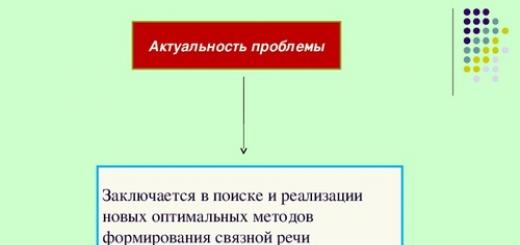A dash is placed when expressing both the predicate and the subject (or only the predicate, or only the subject) with an infinitive: It would be a sin to hide in front of her!(T.); In this city, knowing three languages is an unnecessary luxury.(Ch.); It's an incomparable feeling to hear them[rooks] for the first time after six months of winter death!(Boon.); Having a contract for the responsible... role of the first mezzo-soprano in a serious opera means you will have to carry a repertoire, a lot of new roles(Kis.); No, it’s not only in their sleep that elderly men, who have turned gray during the years of war, cry. They cry in reality. The main thing here is to be on time turn away. The most important thing here is not to hurt the child’s heart so that he doesn’t see how a burning and stingy male tear runs down your cheek(Shol.).
In inversion, the dash may be omitted if there is no pause: What a joy it is to live on earth! Wed: Living on earth is happiness!
A dash is placed between the subject and predicate if they are expressed as numerals (possibly as part of phrases), and also if one of the main members of the sentence is expressed as a numeral: So, nine forty - three hundred sixty, So?(Writing); Somok - two pounds(M.G.); Room area - 22 square meters . In case of using a particle Not a dash is not placed before the numeral-predicate (cf. the same when expressing the predicate as a noun): A man can, for example, say that two and two are not four, but five or three and a half; and the woman will say that twice is two - a stearin candle(T.).
Note. In specialized literature, it is not customary to use a dash in such a speech situation: The mass of such a rangefinder is 23 kg; The maximum range of the laser locator in question is 10 km.
A dash is placed at the predicate, expressed by phraseological units: My brother - handyman; He has talent - God forbid everyone; as well as any stable combination: The mother shed tears of joy, and the father - no matter what!(Cool.); Boots - what do you think of a mirror!(Cool.); Hut - so-so, barn(Shuksh.). Presence of a particle Not, and introductory words at stable combinations in the role of a predicate, it prevents the placement of a dash: This officer is no match for you, Mister Gendarme(Fed.); We have him as a scientist, and plays the violin, and cuts out various things, in a word, a jack of all trades(Ch.).
When expressing predicates in phrases with particles like, as if, what, exactly, sort of like and other dashes, as a rule, are not placed: Pond like shiny steel(Fet); Life like a legend; The sky is like a tent spread out. A dash is not added to the word as, introducing a predicate that lexically coincides with the subject: Ice like ice, deserts like deserts(Kav.); Village like a village(gas.); Job How's work? It's familiar.(Pisces).
A dash is placed between the subject and predicate in place of the zero connective, and therefore it is used in special ways of expressing the predicate - one that can have a connective. The predicate is most often expressed as a noun in the nominative case (common or uncommon): The outbuilding near the house on Sadovaya, designed by Mikhail Aleksandrovich Vrubel, is the only building from the Mamontovs’ possessions that has almost preserved its appearance to the present day(Kis.); Pushkinsky region - the land of stones(Gaych.); This portrait is the only picturesque image of the daughter of Anna Petrovna Kern(Gaych.); Letter to Chaadaev - a unique “memoir” of the poet[Pushkin] about the whole period from July 1834 to October 1836(Eid.).
A dash is not placed with this method of expressing the predicate only in colloquial, everyday speech: My husband and I are not rich people, but educated(M.G.); My sister is a teacher. However, even here a dash is required if there is a contrast: My sister is a teacher, and my brother is a livestock specialist. The same applies to expressing the subject with a personal pronoun; compare: I am a musician. - I am a musician, and my sister is a teacher..
A dash is not placed with a predicate-noun with negation, as well as in the presence of words that complicate the predicate: Love is not sighs on a bench and not walks in the moonlight(Pinch.); The house we live in it's not our home for a long time(Ch.). However, in the presence of opposition, the predicate with negation does not require a dash to delimit the entire composition of the predicate (not...a): And at the same time he noticed that he is not the master in his house, but only component his(M. G.) (cf. without contrast: ...He is not the master of his house).
A dash is placed with a predicate-noun attached by connectives here it is: “Respect for the past is the feature that distinguishes education from savagery,” Pushkin once said(Spread); The whale stone, according to scientific experts, is a sacrificial sanctuary stone of the most ancient era(Gaych.); Guns-nogorye - this is not only a monument historical and literary, it is also a kind of botanical and zoological garden, a wonderful natural monument(Gaych.).
A dash is usually not placed if the predicate is expressed as an adjective: And your room is so good for a child(Ch.); I have a lot good people, almost all are good(Sim.). Of course, a dash is not placed if the predicate-adjective has a verb connective: Winter it turned out to be a harsh day(Paust.); Days stood soft, gray. The river didn't freeze for a long time(Paust.); Water became unusable. They scoop it up exclusively for watering gardens or trees.(Sol.). With a predicate-adjective, a dash is recommended in two cases:
1) with structural parallelism of parts complex sentence: Everything about her appearance attracted attention: her gaze was sharp, her hairstyle was boyish, her clothes were modern and fashionable.; compare: The weather is unbearable, the road is bad, the driver is stubborn, the horses are not carrying, and the caretaker is to blame(P.) - only predicates are emphasized;
2) in the presence of homogeneous predicates, especially if there are other ways of expressing the predicate: Her son is yellow, long and with glasses(M.G.).
Note. By emphasizing the predicate dash it is possible: The wall of the forest was like a chest, and the fire was like a bloody wound in it(M.G.); This lonely and perhaps completely random shot is like a signal(Furm.); His mouth is bitter from tobacco-samosad, his head is like a weight(Shol.); Life is like a vest(gas.).
The presence of a dash, as a rule, emphasizes the author's style: Blackening clearings - like black islands in a white sea(Boon.); I’m angry, strong, and even then among you I’m like a weak cat among rats in a dark cellar(M.G.).
A dash is placed in place of the zero predicate in elliptical sentences divided by a pause into two components - the adverbial and the subjects: They stick together at home. Behind them are vegetable gardens(gas.); Over the yellow straw fields, over the stubble - blue sky yes white clouds(Sol.); Behind the highway there is a birch forest(Boon.); In a large room on the second floor of a wooden house there are long tables, above which hang kerosene lightning lamps with pot-bellied glass.(Kav.). This punctuation mark is especially stable when the parts of a sentence are structurally parallel: There are eleven horses in the yard, and in the stall there is a gray stallion, angry, heavy, busty(Boon.); A wide ravine, on one side - huts, on the other - a manor(Boon.); Ahead is a deserted September day. Ahead - lost in this huge world fragrant foliage, grass, autumn withering, calm waters, clouds, low sky(Paust.).
The dash is placed in incomplete sentences at the place of omission of sentence members or parts thereof. These omissions are common in parts of a complex sentence with a parallel structure, when the missing member is restored from the context of the first part of the sentence: It was getting dark, and the clouds were either parting or setting in from three sides: on the left - almost black, with blue gaps, on the right - gray, rumbling with continuous thunder, and from the west, from behind the Khvoshchina estate, from behind the slopes above the river valley , - dull blue, in dusty streaks of rain, through which the mountains of distant clouds turned pink(Boon.); For him, one story inevitably evokes another, and that one - a third, and a third - a fourth, and therefore there is no end to his stories(Paust.); Behind him [bream] a fat and stubborn perch is visible, then a small bee with yellow suspicious eyes(Paust.); He was a bad artist. His wooden lions looked like fat dogs, and his Nereids looked like fishmongers.(Paust.); Some considered the portrait to be the work of Van Dyck, others - Rembrandt(Paust.); The Krasnovodsk region is rich in oil and gases, Dagestan is rich in gases, Emba is rich in oil and limestone, and Mangyshlak is rich in coal, phosphorites and oil(Paust.). Wed. the possibility of skipping a dash in everyday speech: They both started talking at once, one about cows, the other about sheep, but the words did not reach Kuzemkin’s consciousness(White).
A dash is placed when members of a sentence are omitted, restored in the context of dialogue lines or adjacent sentences: Do you like green onion pies? I am like passion!(M.G.); In another room, a jeweler's workshop has been recreated. In the third there is a shepherd's hut, with all the shepherd's utensils. In the fourth there is an ordinary water mill. The fifth shows the setting of a hut where shepherds make cheese. In the sixth there is simply the setting of a peasant hut. In the seventh there is the setting of the hut where these same chergs and halishte were woven. All this has been skillfully recreated(Sol.); Back in 1835, relatives decided to sell their village in order to improve the serious financial situation. For them, Mikhailovskoye was only a patrimony, a dacha. For him, it is a place of high spiritual transformation(Gaych.).
A dash is placed in sentences consisting of two word forms with the meaning of subject, object, circumstance and constructed according to the following schemes: who - to what, who - where, what - to whom, what - where, what - how, what - where, etc.: All wells are in service; The microphone has a heart!; Book - by mail; Grades are for knowledge; You have the key to the university; Following the record - an accident; Trains - “green”!; First of all - efficiency.
A dash is placed between two (or more) words, which, when combined with each other, mean limits (meaning “from... to”) - quantitative, temporal, spatial: Trains with signs “Moscow - Kara-Bugaz, via Tashkent - Krasnovodsk” will begin departing from the Kazansky station(Paust.); The oldest people of Pushkin's Svyatogorye also came. The youngest of them were at least 70 - 75 years old(Gaych.); Mistakenly believing that the horse chestnut culture in the northwestern parks was not a phenomenon of the 18th - 19th centuries, but a later one, all chestnuts were removed from the Trigorsky and from the burial hill of the Svyatogorsky monastery(Gaych.); Oil reserves at Cheleken are very small and should be depleted within the first ten to fifteen years of production(Paust.); And our strongman diver could hardly take several steps on the ground in five to seven minutes(Paust.).
A dash is placed between two (or more) proper names, the totality of which is called a doctrine, phenomenon, etc.: Boyle's Law - Mariotte; Match Kasparov - Karpov; History of Pechorin - Grushnitsky; Hertzsprung-Russell diagram.
A dash is placed between common nouns, the combination of which performs a defining function for a noun: Teacher-student relationship; The problem of market relations - social protection. The number of combined names can be more than two: The problem of production - man - nature.
A dash can be placed between members of a sentence to highlight and emphasize their position (for stylistic purposes). Most often, such a dash separates connecting member sentences containing an additional message: This is very bad, as I had to write - for a piece of bread(Boon.); He said goodbye to the two who came out with him and headed towards the white statue of Victoria, towards the covered pier, and again the rickshaw wandered along the street - this time to the hotel(Boon.); The rickshaw and its rider rushed among this darkness and dirt of the Ancient East, quickly, quickly, as if they were fleeing from someone - all the way to the Kelani River(Boon.); The next day the seminarians again clashed with the cadets - open, at Summer Garden (Kav.); Throughout the spring, Nikolai met with Ovrazhny only once - by chance, on the street(Shol.).
Members of a sentence that emphasize a quick and unexpected change of actions can be separated with a dash: I jump up and run along the fence(Cool.).
A dash can be used to regroup members of a sentence in case of possible syntactic ambiguity; compare: Brother is my teacher. - My brother is a teacher; and: A month after the news of Petya’s death, which found her a fresh and cheerful fifty-year-old woman, she left the room half-dead and not taking part in life - an old woman(L. T.); compare: ... left the room half-dead and an old woman not taking part in life (left not taking part in life - an old woman not taking part in life).
A dash is placed to convey the intonation gap between words, possible pauses: And here is the river (Steep); With all your body, with all your heart, with all your mind - listen to the revolution...(Bl.) (a dash before the predicate emphasizes its significance). Intonation emphasis, carried out using a dash, is especially characteristic of sentences containing oppositions: It’s scary, sweet, inevitable, I need to throw myself into the foamy shaft, you need to sing like a green-eyed naiad, splash around the Irish rocks(Bl.); I need to prepare firewood for the night, form a camp, in a word, I do the economic part, and you provide the fish(Shol.).
The nominative topic (representation) as a syntactic construction, isolated from the sentence whose topic it represents, is separated by punctuation marks corresponding to the end of the sentence - a period, a question or exclamation mark, an ellipsis.
Each sign introduces a corresponding semantic and intonation connotation: Moscow, Siberia. These two words sounded like the name of the country(TV); Word! Language! You need to write not short articles about this, but passionate appeals to writers, extensive monographs, and the finest studies(Paust.); Bullfinches! How come I didn’t notice them before!(Sol.); Cranes... Swamped with work, far from the gloomy fields, I live with a strange concern - to see cranes in the sky(Sol.); Cold and wild spaces!.. How long ago were these words spoken for the first time and were they said by someone, or did they always silently and powerfully, like a spirit, stand over Siberia, descending on a person traveling with melancholy and anxiety?(Spread); Golden Rose Shameta! She partly seems to me to be a prototype of our creative activity(Paust.); Lunin... No, I can’t help but dwell here on the fate of this great compatriot(Chiv.); Ural! The covenant of centuries and together is a harbinger of future times, and into our souls, like a song, it enters with a mighty bass voice!(TV).
The most common are ellipses (emphasize a moment of reflection, pause) and an exclamation mark (expressiveness) or a combination of an exclamation mark and an ellipsis.
For a nominative topic that is more closely related to the base sentence, in which there is a personal or demonstrative pronoun as a reference word, a dash is used: Death - it calms everything(M.G.); The reader - he knows that it is not the person who is important - what is important is the human spirit(M.G.); Marchenko - he was a man, a golden man(Kaz.); The road in the rain is not sweetness, The road in the rain is trouble(Eut.).
Note. Imitation of conversational (slightly articulated) intonation can serve as a reason for placing a comma when placing a pronoun in contact: Human destinies, they- each on her own, although we seem to live together...(Ast.).
With a nominative subject followed by interrogative sentence, a dot is put: Scientific potential. How to dispose of it?(gas.); Tours in Moscow. What do they mean? (gas.); Commerce. What do you know about her?(gas.).
If the nominative is included in the sentence and the interrogative part of the construction is also a form of the nominative case, then a dash is used: Is the script a work or a semi-finished product? (gas.); "Green revolution"- legend or reality?(gas.). In such cases, it is possible to substitute a ligament is: Parapsychology is trick or reality? Reality or fiction?(gas.).
Note. In print with an interrogative construction nominative topics often separated by a colon, which, however, should be considered inappropriate, for example: Stadium: “health workshop” or football arena?(gas.); Literary work: symbol or model?(gas.); Wed. Also: Student life: what should it be like?(gas.). The colon sign loses its main, explanatory function here.
With transitive verbs with negation, in some cases the use of the genitive case of the object clearly predominates, in others the use of the accusative case, and in others their optional use is observed.
Genitive, which in the construction under consideration has the meaning of an underlined negation, is usually used in the following cases:
if there is a particle in the sentence neither or starting with a particle neither pronouns or adverbs, for example: Yes we arewe have no idea about what is happening to these unfortunate people...(L. Tolstoy); Never still hedidn't feel so sad about your defenselessness, your powerlessness(Bitter); Up to younobody also this braceletdidn't wear it (Kuprin); ... Doesn't make it any easier reading process(Academician F.F. Fortunatov);
with a dividing-quantitative value of the addition, for example: ... Don't give whetherwater ?; I tell youI won't get bread ... You won't drink milk on the road?; At lunch it turned out that hedoesn't drink wine Anddoesn't eat meat (all examples from Gorky); Did not buy for teasteering wheel (Fedin);
with verbs of perception, thought, desire, expectation ( see, hear, understand, think, know, want, desire, expect etc.), for example: Sorrow in her words Samghinhaven't heard (Bitter); He... villagesdid not know (Chekhov); Styopka swallowed... sweets and evendidn't notice their taste(V. Grossman);
with verbs have, get, get etc., which in combination with a particle Not take on the meaning of complete negation, for example: doesn't have rooms,not received order,didn't get it ticket,did not purchase necessary things;
when expressing complements with abstract nouns: does not give reasonsdoesn't detect understanding,doesn't lose hope,doesn't hide joy, joydoes not implement control,doesn't miss case,doesn't concessions. For example: There's noise heredo not like (Bitter); I'm having funnot looking (V. Ketlinskaya); Morningdidn't bring clarity(Leonov);
in stable combinations, proverbs, sayings, more often when expressing a complement with an abstract noun, for example: does not feel desire, does not have hope, does not find support, does not make a secret, does not give way, does not dote on the soul, does not take part, does not pay attention, does not give peace, has no idea, does not inspire confidence, does not miss an opportunity; You can’t turn back yesterday; Don't trust someone else's secrets. Also, with a specific meaning of a noun: does not take his eyes off, tirelessly; Chickens don't eat money; You can't get bread by lying; You can't break a butt with a whip; You can't bite your elbow; Murder will out;
with gerunds or participles, due to the bookish nature of these forms, for example: Not receiving answer, the old man goes to the station(Chekhov); ... Suddenly they diewithout finishing poems(Simonov);
in infinitive sentences that emphasize the categorical nature of the negation, for example: Can't catch up you have a crazy three... (Nekrasov); When troops pass, no one windowsDon `t open ... (V. Vishnevsky).
Accusative, weakening the meaning of negation, is usually used in the following cases:
when pointing to a specific object (“this particular object, and not just any other object”): not reviewed the manuscript that was sent to him;didn't drink milk that her mother left her. For example: Hedidn't reject then with contempt these hundred rubles(Dostoevsky); Don't tilt the banner... (Bitter);
when expressing a complement with an animate noun, in particular a person’s own name, for example: Youdon't like mother(L. Tolstoy); ... Won't regret it neither dad nor mom(Bitter); Anna Nikolaevnadidn't deceive Marya Alexandrovna... (Dostoevsky); Malaisenever left Kozma still has a long time to come(Bunin).
The same applies to toponyms, since they are also thought of as specific, well-defined concepts, for example: Don't give up Port Arthur... (Bitter).
Optional the use of the genitive and accusative case with a transitive verb with negation is associated with a stylistic difference: constructions with genitive case characteristic of book speech, constructions with the accusative case - for colloquial speech. Wed: II'm not belittling someone's merits... (Bitter). – That's how you diewithout speaking this word(aka).
For verbs with a prefix under-, which does not have the meaning of negation, but indicates the performance of an action below the norm, the addition is usually put in the form of the accusative case, for example: underload a ton coal,not deliver mail, fill up the glass, underestimate strength enemyunderbake the pie, underfulfill the plan; The genitive case in these cases is used for the quantitative and dividing meaning of the object, for example: not enough parts, not enough oil, not enough bricks, not enough water, not enough money.
Staging direct object in the accusative case form is required in cases where the negation “not” does not appear with a transitive verb, but with another word in the sentence, for example: Not quiteUnderstood exercise,Not VeryI love painting,Not oftenI'm reading fiction.
With a subject expressed by a noun in a collective meaning ( number, majority, minority, part) in combination with a noun in the plural and the Genitive case, the predicate is usually placed in the plural if we're talking about about animate objects, in singular, if the subject denotes objects of inanimate nature.
With nouns years, months, days, hours
At the words a lot, a little, a little, a lot, How many the predicate is usually placed in the singular.
With a subject expressed by a group of words (names literary works, newspapers, magazines, enterprises, etc.), among which there is a leading word or words in the Nominative case, the predicate agrees with this word or words. For example, "Hero of Our Time" written M.Yu. Lermontov; "Fathers and Sons" written It is impossible to say to I.S. Turgenev, since the generic name should be added; should be said like this: The novel “Fathers and Sons” was written by I.S. Turgenev.
For complex names consisting of two words of different grammatical gender, the predicate is consistent with that of them that expresses a broader concept or denotes a specific object. For example, the cafe car is located (not located) between the sixth and seventh cars; The cafe-dining room has been renovated.
With masculine nouns that name a profession, position, title, but denote a woman, the predicate in book styles is often put in the masculine form, and in colloquial styles it is often in the feminine form: University rector regularly performed in front of employees.
Agreement with such nouns of definitions in the feminine gender ( Our referent...) is conversational in nature.
When the subject is expressed by a combination of a common noun and a proper name, the predicate agrees with the latter: Referent Ivanova helped make a report to the director.
When the subject is expressed by an invariable part of speech (adverb, conjunction, particle, interjection), the predicate is put in the singular form, and in the past tense - neuter: "Uh-uh" often is heard in the answers of the interviewees. “Why” sounded most often in his questions.
For interrogative, negative and indefinite pronouns like who (nobody, somebody) the predicate is put in the singular masculine form, even if we are talking about many persons or a female person: Who of them (women) the first raised question of equality? Someone in a black hat looked in to the office.
With a pronoun like what (nothing, something) the predicate in the past tense is put in the singular form of the neuter gender, even if we are talking about many objects or the name of a certain gender (masculine or feminine): « What It happened? – Something(cup or saucer) fell off the shelf.
If the subject is expressed by a collective noun like kids, old people, denoting many persons or objects as one whole, the predicate is used in the singular. There were old clothes hanging and lying around in the wardrobe.
For transitive verbs that are used with negation Not, (do not open letter, don't read telegram), (don't mind attention, do not be afraid threats).
didn't put forward any X arguments); Not Meeting did not accept the offer presiding officer.
Meeting couldn't accept such solution.
II. Difficult cases nominal and verbal control.
There are variants of forms of control in the Russian language for transitive verbs.
It is possible to choose the case (genitive or accusative) of the direct object for transitive verbs with negation. Didn't read the letter(s). The accusative case is preferable in the following cases:
If the object is a proper name;
When the complement is inverted, i.e. when the object comes before the verb;
With double negative;
With the imperative form of the verb.
With prepositional control, difficulties are caused by the choice of case, as well as the choice of preposition with the controlled word.
Prepositions “thanks to”, “despite”, “according to” control the dative case (thanks to doctors).
Pretext "By" in meaning "after" controls the prepositional case (on arrival from a business trip).
2. Stringing of cases those. arrangement of several identical case forms in a chain. Such a cluster of cases makes it difficult to understand (a book by the niece of the husband of the teacher of my neighbor’s son). To correct this error we need to replace some of these case forms with subordinate clauses, participial phrases, verbal nouns, to the infinitive, etc. It is also necessary to avoid the same case forms with the same prepositions.
3. With transitive verbs, which are used with negation Not, the direct object can be expressed not only in the accusative case, but also in the genitive case. In the accusative case, nouns denoting specific objects are more often used (do not open letter, don't read telegram), and in the genitive - nouns denoting abstract concepts (don't mind attention, do not be afraid threats).
However, in some cases only one or the other case is used. Thus, the genitive case is used in the following cases: 1) if the negation is not strengthened with the help of negative pronouns like no, no one, nothing (When deciding this issue, the presiding didn't put forward any X arguments); 2) if the role of the predicate is a verb with a particle Not, combined with an abstract noun: Meeting did not accept the offer presiding officer.
Only the accusative case is used if the negation does not precede the finite form of the verb, followed by the infinitive and then the direct object: Meeting couldn't accept such solution.
4. Use participial phrases.
An action expressed by a gerund or participial phrase refers to the subject (As I drove through a birch grove, I remembered my native village). The main action, expressed by a verb, and the additional action, expressed by a gerund, are performed by one person (object).
The participle can be used in impersonal offer, if it contains an infinitive (when sitting down at the table, you need to wash your hands).
Some verbs do not form participles with the suffix –а(-я) in the present tense: write, run, take care, can, knit, sing, etc.
Errors that arise when using gerunds and participial phrases:
1. The action expressed by the predicate and the action expressed by the gerund refer to different persons (or objects). (After smoking, a conversation began between the soldiers.)
2. The use of gerunds in an impersonal sentence, where there is a logical subject expressed in the indirect case, and there is no infinitive. (Listening to this music, I imagine a picture of a hurricane).
3. The use of a gerund in a sentence that is a passive construction. In this case, the subject of the action does not coincide with the passive construction and does not coincide with the subject of the action indicated by the gerund. (Having run away from home, the boy was found by his parents).
There is no dash between the subject and the nominal predicate:
1. If the subject is expressed by a personal or demonstrative pronoun: She his daughter. He wants to understand her(Shcherb.); Is this an office? Is this a bedroom? (Ch.)
Note. A dash is possible: a) if the entire sentence contains a question accompanied by surprise: Is she his daughter?!(both members of the sentence are stressed); b) when underlining the indication of a given item: This is an office (And this is the office); c) when contrasted: I am a teacher and you are an engineer.
2. If one of the main members is expressed by an interrogative pronoun, and the other by a noun or personal pronoun: Who is your protector? What is study? Who is she?
3. If the predicate-noun has a negation: Landscape not an add-on to prose and not a decoration(Paust.); Russia is not St. Petersburg, it is huge (Prishv.); Old age is not joy (last). However, when contrasting a predicate with a negation, a dash is required (not... a): And at the same time he noticed that he was not the master in his house, but only an integral part of it(M. G.) (cf. without contrast: He is not the master of his house).
4. If the predicate is expressed by an adjective or participle: And your room is so good for a child (Ch.); I have a lot of good ones people, almost all good(Sim.); He had two wounds. Wounds easy , but the man lost a lot of blood(Paust.); Log house pink, peeling, small, rustic, covered with a green iron roof(Kav.); In the harsh autumn the late appearance is sad (Sick); In the dining room the feast is hot and ardent (Sick).
However, with a predicate-adjective, a dash is placed when there is structural parallelism of parts of the sentence, accompanied in oral speech by intonation (emphasis) of both members of the sentence: Everything in her appearance attracted attention: the look - sharp, hairstyle - boyish, clothes - modern, fashionable; Wed with emphasis on only the predicate: The weather is unbearable, the road is bad, the driver is stubborn , the horses don't carry, and the caretaker is to blame(P.). A dash is also possible in the presence of several (homogeneous) predicates: Her son is yellow, long and with glasses(M.G.).
5. If the predicate is expressed in a phrase with comparative particles like, as if, what, exactly, sort of like and etc.: Life like a legend; Sky like a pitched tent; Brooch kind of like a bee(Ch.); The forest is definitely a fairy tale; A week is like one day . Passes quickly; Pondlike shiny steel(Fet). A dash is also not placed when introducing a predicate that lexically coincides with the subject: Ice like ice, deserts like deserts (Kav.); A village is like a village; A house is like a house - old, dark(Shuksh.).
Note. When emphasizing the predicate (usually for stylistic purposes), a dash is possible: This lonely and perhaps completely random shot -like a signal(Furm.); His mouth is bitter from tobacco-samosad, his head islike a weight(Shol.); Blackening glades -like black islands in a white snowy sea(Boon.); Milky Way - like a big society(B. Past.); Moon in the sky -like Central Asian melon(Current.).
6. If between the subject and the predicate noun there is an introductory word, circumstance or addition, as well as a conjunction or particle: Rook, of course , the bird is smart and independent, but he has no voice(Paust.); My father for me friend and mentor; Moscow Now port of five seas; My brother Same engineer; This stream just the beginning of the river.
1. When combining a generic concept with a specific one, the definition agrees with the word denoting the generic concept, for example: huge tree eucalyptus; japanese flower camellia; sea bird petrel.2. When combining a common noun and a person's own name, the definition agrees with the closest noun, for example: attentive doctor Petrova - doctor Petrova, attentive to the sick.3. When combining a species concept and an individual geographical name the definition is consistent with the species concept, for example: highest mountain Everest4. When combining a generic name and a conventional name, the definition agrees with the generic name, for example: popular weekly "A week"; confectionery factory"Bolshevik"5. For complex terms like dairy cafe the definition, like the predicate, is consistent with the part that expresses a broader or more specific concept, for example: dietary cafe- dairy, interesting competition-quiz, new"Novel- newspaper». As with the agreement of the predicate, the inclination or indeclinability of the first part plays a role; The order of the parts also influences, for example: Ferapontov was fat... man, with thick lips, with a thick lump-nose.6. With complex units of measurement, the numeral agrees with the second (declined) part, for example: one volt- second, one gram- molecule.
7. With abbreviations inclined the definition is consistent grammatically, for example: capital university , durable bunker. With abbreviations unyielding the definition is consistent with the leading word of the expanded compound name, for example: Bratsk hydroelectric power station , But local general store .
Variants of case forms of the object for transitive verbs with negation.
With transitive verbs with negation, in some cases the use of the genitive case of the object clearly predominates, in others the use of the accusative case, and in others their optional use is observed.
1. R. case, which in the construction under consideration has the meaning of an emphasized negation, is usually used in the following. cases:
1) if there is a particle in the sentence neither or starting with a particle neither pronouns or adverbs, for example: Yes, we don’t have the slightest idea about what is happening to these unfortunate people... (L. Tolstoy); Never before had he felt so sadly his defenselessness, his powerlessness (Gorky);
2) with a dividing-quantitative meaning of the addition, for example: ...Should I give some water?; I won’t get you bread... Would you like some milk for the road?; At dinner it turned out that he did not drink wine or eat meat (all examples from Gorky);
3) with verbs of perception, thought, desire, expectation (see, hear, understand, think, know, want, desire, expect, etc.), for example: Samghin did not hear sadness in her words (Gorky); He... didn’t know the village (Chekhov); Styopka swallowed... the candies and didn’t even notice their taste (V. Grossman);
4) with verbs to have, receive, get, etc., which in combination with a particle do not acquire the meaning of complete negation, for example: does not have a room, did not receive an order;
5) when expressing the addition with abstract nouns: does not give reasons, does not reveal understanding, does not lose hope, does not hide joy, does not exercise control, does not miss an opportunity, does not make concessions. For example: They don’t like noise here (Gorky); I'm not looking for fun (V. Ketlinskaya);
6) in stable combinations, proverbs, sayings, more often when expressing an addition with an abstract noun, for example: does not feel the desire, does not have hope, does not find support. Also, with the specific meaning of a noun: does not take his eyes off, tirelessly; You can't bite your elbow; Murder will out;
7) with a gerund or participle, due to the bookish nature of these forms, for example: Having not received an answer, the old man goes to the station (Chekhov); ...They suddenly die without finishing their poems (Simonov);
8) in infinitive sentences that emphasize the categorical nature of the negation, for example: You won’t catch up with the crazy three... (Nekrasov);
2. V. case, weakening the meaning of negation, is usually used in the following cases:
1) when pointing to a specific object (“exactly this object, and not just any other object”): he did not review the manuscript that was sent to him; did not drink the milk that her mother left her.
2) when expressing a complement with an animate noun, in particular own name faces, for example: You don’t love your mother (L. Tolstoy); ...He will not regret either dad or mom (Gorky); The same applies to toponyms, since they are also thought of as specific, well-defined concepts, for example: Don’t give up Port Arthur... (Gorky).
3) often when the complement is inverted (putting it in front of the predicate verb), for example: I don’t like this magazine (Turgenev); ...The door was not closed (Dostoevsky);
4) in interrogative and exclamatory sentences, the general meaning of which does not have the nature of negation, for example; And who knows, when gray-haired you come under the closed crowns of your pets, you will not experience pride ten times greater than the creator of other hasty books... (Leonov);
5) in incentive sentences (with a predicate in the form of an imperative mood), due to their conversational nature, for example: Look at your step, don’t make people laugh (Gorky);
6) in the perfect form of the predicate verb, indicating the effectiveness of the action, for example: ... I will not hand over the armored train to anyone else (Vs. Ivanov); But we will not give up this place (Simonov);
7) with double negative (i.e., strengthened statement), for example: I can’t help but say a few words about hunting (Turgenev); It’s impossible not to feel sorry for this meek provincial creature... (Leonov);
8) when different but identically sounding case forms coincide to eliminate ambiguity: I didn’t read the newspaper today (the newspaper form could mean plural). For example: ...In order not to encourage the feeling of a usurer in a person (Gorky)
9) in the presence of words (particles) with a restrictive meaning: almost missed the lecture, almost dropped the glass. For example: Once he even shushed him, for which he almost lost his place (Chekhov);
10) if there is a word in the sentence that in its meaning refers simultaneously to the direct object and the predicate: they do not consider the issue relevant, I do not find these measures timely. For example: She does not recognize this intriguer as her daughter (L. Tolstoy):
11) when distributing the addition with several definitions, for example: Sofya Ivanovna coughed gloomily, listening to Lenochka, and did not recognize her as a quiet, meekly silent and indifferent daughter to everything (P. Pavlenko);
12) usually in the construction “not + auxiliary verb + infinitive of a transitive verb + object” (i.e. when the object is attributed not directly to the verb with negation, but to the infinitive depending on the verb with negation, which weakens the influence of negation): could not submit the manuscript, did not expect to complete the task. For example: Old man Lavretsky could not forgive his son for his wedding for a long time (Turgenev); Less common in these cases is a construction with the genitive case, for example: ... I couldn’t hear his sad voice, I couldn’t see his melancholy and suffering (Korolenko); We do not know how to simply take from life its joys (Kuprin);
13) in stable combinations, proverbs, sayings, usually when expressing an addition with a specific noun, for example: do not put a spoke in the wheels, do not show your teeth; Teach your grandmother to suck eggs.
Note. To create a comic effect in artistic speech, the genitive case can be used: Don’t talk to me (Chekhov).
3. Optional use of p. and c. case for a transitive verb with negation is associated with a stylistic difference: constructions with the genitive case are characteristic of book speech, constructions with the accusative case are characteristic of colloquial speech. Wed: I do not belittle anyone’s merits... (Gorky). - So you will die without uttering this word (aka).
4. For verbs with the prefix under-, which does not have the meaning of negation, but indicates that an action is performed below the norm, the addition is usually placed in the accusative case, for example: underload a ton of coal, underload mail, underfill a glass, underestimate the strength of the enemy, underbake a pie, underfulfill plan; R. the case in these cases is used with the quantitative and dividing meaning of the object, for example: not enough details, not enough oil, not enough money.
5. Setting a direct object in the form of the accusative case is mandatory in cases where the negation “not” does not appear with a transitive verb, but with another word in the sentence, for example: I didn’t fully understand the task, I don’t really like painting, I don’t often read fiction.










